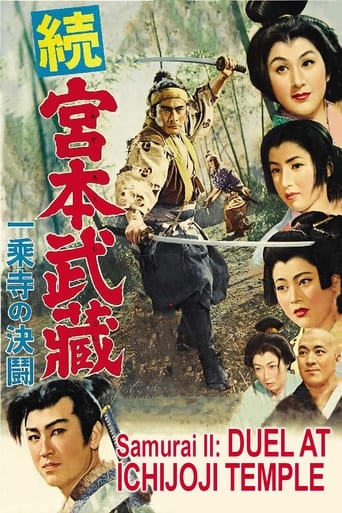Charles Herold (cherold)
I enjoyed the first movie in the famous Samurai trilogy, but I was considerably less impressed with this middle film. The disjointedness of the first movie is even more noticeable here. There are a lot of characters and subplots and characters that don't really go anywhere. Much of the movie is laughably absurd, such as the way women fall at their feet over the rather bland protagonist (Mifune isn't nearly as memorable in these films as in his Kurosawa movies), and the determination of the students of a fighting school have in protecting their master at the expense of his reputation makes little sense, especially as Musashi keeps mowing them down.The whole looking-for-people-to-kill premise seems a bit weird as well; in American westerns it's usually the bad guys who keep picking fights. And the rather standard "there's more to being a Samurai than killing" message seems murky; it's no wonder Musashi takes so long to get it.Some of this may just be cultural, with tropes that make sense to the Japanese. But I can't see any way to excuse the use of master swordsman Sasaki. He's a really interesting character, well acted by Koji Tsuruta, but the whole movie is his just happening to be in the right place at the right time, and it's an incredibly lazy screen writing crutch.As in the previous movie, the sympathetic Otsu and women in general are treated by dirt even by those who care about them. That may be accurate, but it's also depressing.Visually the film is striking, and the combat scenes are well done and pretty entertaining, but overall this movie is poorly structured and generally absurd.
Atavisten
'Ichijouji no ketto' takes up the transformation of Musashi into a proper samurai and feels like an empty middle part just for tying the trilogy together.Musashi is here torn between becoming a true samurai and the woman that loves him, Otsu. That is, he doesn't seem to care the slightest bit for Otsu, while she on the other hand is painstakingly waiting for his return. She is portrayed as being very weak, which annoyed me.What the prequel had in adventure and excitement is not present in this movie, its more about the ideas of the samurai and samurai thought. Toshiro Mifune gets a shallow character so he cant help it much with his presence. The fight scenes are good though.
OttoVonB
The tale of Myamoto Musashi - thief, lover, rogue, then warrior, hero and master - is enshrined in Japanese culture, perfect showcase material as it were. It has been adapted more than once to the screen, and Inagaki's classy, colorful version is perhaps the best known. It is everything you'd expect from a period samurai film if you've never seen one and harbor no negative preconceptions.After a playful first part that has a classic hero's journey structure, part II takes things to the next level without having to rush to the finish, and is the more interesting film. It allows the hero to wield his newfound power without the restraint and inner peace he will later find. It allows him the get mad, and nobody does unleashed fury like Toshiro Mifune, not when you throw 80+ armed fools in this way.I chose to review this one because it is a good sample of the very best this trilogy accomplishes: compelling archetypical characters, lush cinematography and that "oriental" elegance that always seduces non-Japanese audiences, drawn in as they are by the very universal plot and character dynamics.I cannot put it in the same leagues as the masterpieces of Kurosawa, Ozu and Kobayashi, but if it is to be a gateway film experience, then it is a bloody good one, and laudable for what it accomplishes.You might really enjoy this, and if you do, it's just the beginning!
juuri-2
Every woman he meets, falls in love with him.Every samurai he meets, meets his sword.Truly epic in every way, just see it.



